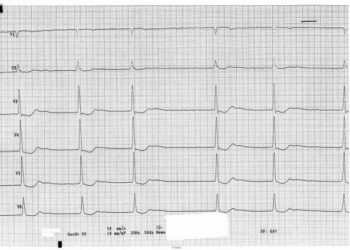Older patients with STEMI and cardiogenic shock benefit from percutaneous coronary intervention
1. In this retrospective analysis of patients 75-years or older with ST-elevation myocardial infarction (STEMI) and cardiogenic shock, use of percutaneous coronary intervention (PCI) was associated with lower in-hospital mortality.
2. The use of PCI for older patients with STEMI and shock increased during the study period.
Evidence Rating Level: 2 (Good)
Study Rundown: Age remains one of the most significant risk factors for the development of coronary artery disease. With the aging North American population, the number of elderly patients (>75 years) presenting with STEMI is increasing. Previous studies of PCI in the setting of STEMI complicated by cardiogenic shock have demonstrated improved mortality in younger patients but the benefit in older patients with more comorbid conditions has not been consistently shown across subgroup analysis of available trials. The current study is a national retrospective cohort analysis that examined trends in management of patients 75-years or older with STEMI complicated by cardiogenic shock. The study found that the rate of cardiogenic shock decreased over time, as PCI also became more commonly used. The utilization of PCI was associated with a reduction of in-hospital mortality.
The main strength of the study was the large, national cohort from a variety of geographic centers. The limitations of this study included the retrospective design which could introduce bias.
Click to read the study in JACC
Relevant Reading: Temporal Trends and Outcomes of Patients Undergoing Percutaneous Coronary Interventions for Cardiogenic Shock in the Setting of Acute Myocardial Infarction
In-Depth [retrospective cohort]: This study was a retrospective cohort analysis of patients from the National Inpatient Sample (NIS) of discharged patients from the United States. The study included all adult patients ≥75 years who experienced STEMI and cardiogenic shock during the index hospitalization between 1999 and 2013 who were admitted directly from an emergency department. Patients who were not admitted, or died prior to PCI, were excluded. International Classification of Diseases-9th Revision (ICD-9) diagnoses codes were used to determine admission diagnosis and medical comorbidities. The primary outcome was in-hospital mortality in the PCI vs. non-PCI groups.
The study included 317,728 patients with STEMI and cardiogenic shock, of whom 111,901 were 75 years of age or older. The use of PCI was associated with a lower risk of in hospital mortality (Mantel-Haenszel odds ratio: 0.48; 95% confidence interval [CI]: 0.45 to 0.51). During the study period, PCI in this population became more common (1999: 27% vs. 2013: 56%, p < 0.001) with an overall reduction in-hospital mortality (1999: 64% vs. 2013: 46%; p < 0.001).
Image: PD
©2019 2 Minute Medicine, Inc. All rights reserved. No works may be reproduced without expressed written consent from 2 Minute Medicine, Inc. Inquire about licensing here. No article should be construed as medical advice and is not intended as such by the authors or by 2 Minute Medicine, Inc.






